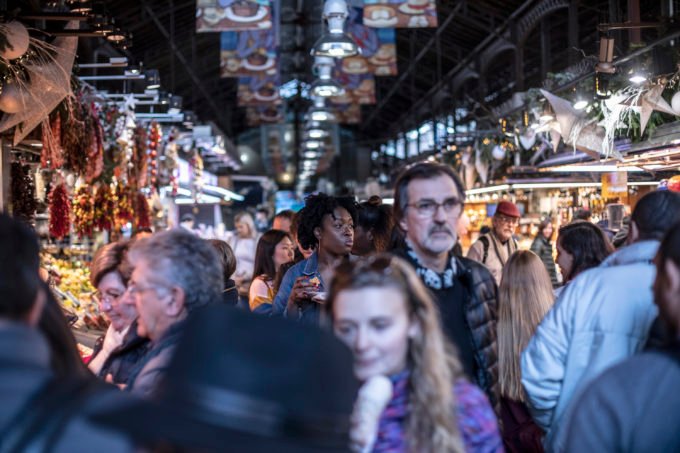
Your Guide to La Boqueria

How to work Barcelona’s greatest market like a local.
Start early. The Catalan grandmas know best: Show up at 8 a.m., just as the Boqueria opens, and have the market to yourself. For the first few hours of the day, you can wander aimlessly, watch purveyors build their stands piece by piece, and make all your purchases hassle-free. After 10 a.m., all bets are off.
Use alternative routes. There are nearly a dozen ways to access the Boqueria, and the worst way to enter is through the front door. Come and go through any of the side entrances and you’ll save precious time and sanity.
Tread lightly. Vendors have grown (understandably) frustrated in recent years as they’ve watched their lifelong clients chased away by the foreign masses. Don’t clog up the few routes through the market, don’t touch the produce without asking, and please don’t turn your trip to the Boqueria into an Instagram photo bonanza. (Which means holster that damn selfie stick!)
Learn the language. Spanish markets have an idiom all of their own, and you’d be wise to learn a few of the phrases. Chief among them is quien es el último? (qui és l’últim in Catalan)—who’s the last in line? There are no physical lines or number systems in the Boqueria, so establish who’s last when you arrive and be ready to order once they’ve been tended to. Beyond that, be ready for all manner of flattery—hola reina! (hi queen!), que querías guapo? (what would you like handsome!)—to get your attention.
Eat like a local. Ignore the smoothies, the sliders, the chorizo sticks. Instead, belly up to one of the great classic tapas bars of the market: Pinotxo, El Quim de la Boqueria, and Universal form the sacred trinity, but some of the newcomers do strong work, too. Order what’s in season (wild mushrooms in the fall and early winter, baby peas and artichokes in the spring, tomatoes and eggplant in the summer), plus a plate or two of seafood (razor clams, fat red shrimp, salt cod) straight from the heart of the market. Wash it all down with a few glasses of cava.
The Ultimate Boqueria Shopping List:
-Cured pork from Aroma Ibèric. Jamón ibérico de bellota, the fat-rippled, acorn-fed ham from central and southern Spain, is the greatest protein on the planet, but don’t stop there: sobrassada (a spreadable sausage spiked with smoked paprika), chorizo, morcilla (blood sausage), and lomo de caña (cured pork loin, a true stunner) should all be on the menu while in Spain. (Note: Due to draconian USDA regulations, it’s illegal to bring cured meat into the United States, but we won’t tell anyone!)
-The big cheeses from Formatgeria Elisa. Most people’s knowledge of Spanish cheese starts and stops with Manchego, but there’s a world of worth discovering. Garrotxa (a young Catalan goat cheese), Idiazábal (a Basque sheep’s milk cheese with a whisper of smoke), and Torta del Casar (a soft, fragrant cheese from Extremadura) are all world-class cheeses.
-Olives, Saffron, Canned Seafood from Olives Francesc. These guys carry a full spectrum of Spain’s greatest pantry items, from piquant first-pressed olive oil to jewel boxes stuffed with saffron to the best of Spanish canned seafood. Spend 50 euros here and bring a good chunk of España with you back home.
-Dried wild mushrooms from Bolets Petràs. Catalans are fungus fiends, and Petràs has the best of the best, including mountains of dried specimens at very reasonable prices. Bring home a few hundred grams to supercharge your cooking.
Up Next
The Battle for the Boqueria
Barcelona City Guide
23 Things to Know Before You Go to Barcelona
Your complete survival guide to the Catalan capital.
Barcelona City Guide
A Neighborhood Guide to Hotels in Barcelona
Check out this guide on where to stay—and why—from Trivago’s Teresa Fernandez.
Barcelona City Guide
A Soundtrack to Barcelona
From urban EDM stars to rural sister acts, here’s a playlist for the Catalan crown city.
How Vietnam Eats Today:
Q&A with Daniel Nguyen
Ahead of our League of Travelers trip to northern Vietnam, R&K’s Charly Wilder caught up with Daniel Nguyen, an activist, distiller, researcher, and our host for this fall’s journey into the highlands and beyond.






